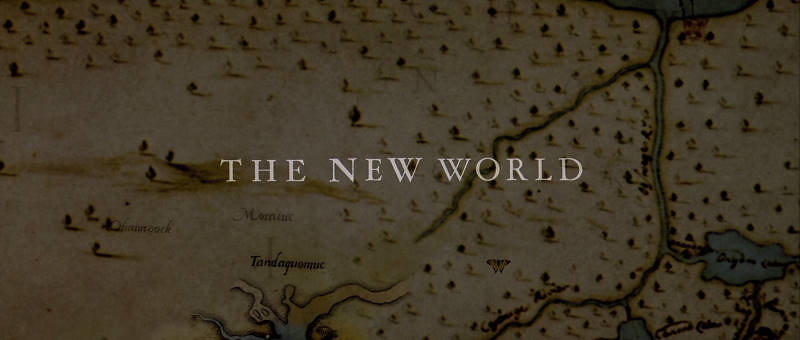
I know there are significantly longer cuts of this film, but the original DVD release is the only version I have, and the only version I have seen. I also know Terence Malick is somewhat notorious for his shooting and editing style, but I do not know the details of that style well enough to speak with authority. All I can do is judge the film based on the version I've seen, and speak of the pacing and style of what there is, not how it was made or what is missing.
All that is a prelude to saying, despite it's two-plus hour length and feeling of completeness (and pleasanty slow pace), it feels like this film should be about an hour longer, at least. It feels epic in that impossible, Malicky way, and it deals with such a broad swath of history so breezily that it ends up feeling like it wants more. Entire patches of proto-American history, or of Pocahontas's life, whip by in a single shot -- elements as crucial as John Smith's deposition or Pocahontas's pregnancy and childbirth. Rarely does the dialogue carry the story directly, though one beautiful scene between John Smith and Pocahontas in England does a wonderful job of letting the characters finally speak with meaning ("Did you ever find your Indies, John? You will," she says. He looks at her sadly, and after a moment replies, "I may have sailed past them.")
But the real story here is in the subtext, which is rich and could probably be unpacked for ages. Single images convey so much information -- John Rolfe pokes his head out the window of his house to watch "Rebecca" in the field: Rolfe leans out from the security and safety of civilization without ever leaving it, and admires the lady gently taming the wilderness. John Smith spends the majority of his story in shackles of some sort, including the shackles of being President of Jamestown, and has very little agency of his own in the story -- that he does not buckle, that he exercises what little will he has in service of his own heart is telling.
That this story gets away without having any real antagonists is also telling. This is a history without victors and conquereds, and of our three primary male leads (John Smith, John Rolfe, and Chief Powhatan) are all acting out of love, not out of malice, or greed, or jealousy, or possessiveness -- and not coincidentally, all are motivated by believing Pocahontas is the greatest treasure the world's ever seen. Although the backdrop of this story is the pre-infancy of America and the intersection of English colonists and Algonquin "naturals," this is actually the simplest love story of all time -- a love triangle where nobody fights anybody over anything. In fact, so little conflict actually happens (w.r.t. the story's primary plot, the love story) that the entire thing could be boiled down to a simple: She falls in love with suitor 1, but suitor 1 is forced to leave her; he lies and convinces her he's died so she can move on, and she allows herself to be wooed and married by suitor 2; she discovers suitor 1 is still alive and feels conflicted; suitor 2 loves her enough to let her go, and she explores her feelings for suitor 1, discovering that things have changed; she returns to suitor 2 a happier woman. (That's the complicated version! The short version might be as simple as "She has to choose between her first flame and her faithful husband and chooses the faithful husband.")
In other words, The New World is a meditation on the politics of staking claim to another's property (land, wife). The wife realizes, after some deliberation, that the newer claimant is the proper one, though she dies when she leaves her original love behind. The land, we know, after much "deliberation" of sorts, will remain in the hands of its new claimant as well, and perhaps it too dies when it leaves its original love (the "naturals") behind. But Pocahontas assures her husband that all things pass, and because they leave behind a child who lives all is well. Is it crazy to wonder if Malick is suggesting that yes, it's tragic that America went from the hands of its natives into the hands of colonists and takers, but all eras must pass, and because America's children live on, all is well?
Food for thought, which Malick films are beautifully, resplendently, amazingly full of.

No comments:
Post a Comment